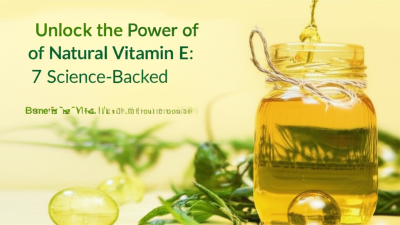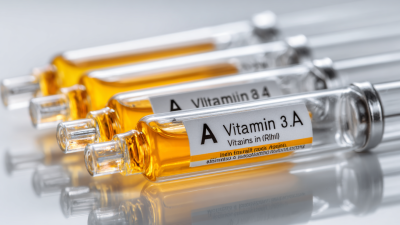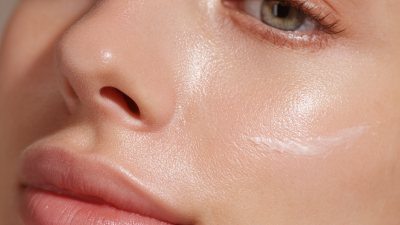 Unlocking the power of Natural Vitamin E can transform your approach to health and wellness in ways you might not have imagined.
Often overlooked, this essential nutrient plays a pivotal role in supporting various bodily functions and enhancing overall vitality.
As we delve into the science-backed benefits of Natural Vitamin E, you will discover its remarkable contributions to
skin health, immune function, and cellular protection, among others.
Whether you are looking to boost your daily nutrient intake, improve your immune system, or combat oxidative stress,
understanding the true potential of Natural Vitamin E is key. Join us as we explore seven compelling benefits that highlight why incorporating this powerful antioxidant into your diet can lead to significant health improvements and more vibrant living.
Prepare to be enlightened by the surprising advantages that Natural Vitamin E brings to the table!
Unlocking the power of Natural Vitamin E can transform your approach to health and wellness in ways you might not have imagined.
Often overlooked, this essential nutrient plays a pivotal role in supporting various bodily functions and enhancing overall vitality.
As we delve into the science-backed benefits of Natural Vitamin E, you will discover its remarkable contributions to
skin health, immune function, and cellular protection, among others.
Whether you are looking to boost your daily nutrient intake, improve your immune system, or combat oxidative stress,
understanding the true potential of Natural Vitamin E is key. Join us as we explore seven compelling benefits that highlight why incorporating this powerful antioxidant into your diet can lead to significant health improvements and more vibrant living.
Prepare to be enlightened by the surprising advantages that Natural Vitamin E brings to the table!
Natural Vitamin E is renowned for its potent antioxidant properties, making it a vital nutrient for protecting our cells against free radical damage. As we age, our bodies become more susceptible to oxidative stress, which accelerates the aging process and contributes to various chronic diseases. Research underscores that natural Vitamin E can neutralize harmful free radicals, thus safeguarding cellular integrity and promoting overall health.
In recent years, the demand for effective anti-aging ingredients has surged, with consumers seeking compounds that provide robust cellular protection. Similar to the rising star Ergothioneine, which is celebrated for its targeted antioxidant effects and mitochondrial protection, natural Vitamin E plays a crucial role in combating oxidative damage at the cellular level. Its benefits extend beyond simple antioxidant capabilities, as it also supports skin health, enhances immune function, and promotes longevity, making it an indispensable addition to any wellness regimen or skincare routine.
Natural Vitamin E is a powerful antioxidant that plays a crucial role in protecting our cells from oxidative damage caused by free radicals. This chart illustrates the science-backed benefits of Vitamin E, highlighting its importance in various aspects of health including antioxidant protection, heart health, skin health, cognitive function, immune support, anti-inflammatory effects, and eye health.
Natural Vitamin E is increasingly recognized as a skin superfood, with its potent antioxidant properties offering critical support for healthy aging and repair. According to a report by the National Institutes of Health, Vitamin E plays a vital role in protecting skin cells from oxidative stress caused by UV radiation and environmental pollutants. This protection helps in minimizing the appearance of fine lines, winkles, and age spots, contributing to a more youthful complexion.
Moreover, the topical application of Natural Vitamin E is shown to enhance skin hydration and improve its elasticity. A study published in the "Journal of Cosmetic Dermatology" found that participants who incorporated Vitamin E into their skincare routines experienced a 20% increase in skin hydration levels over eight weeks. This not only contributes to a plump and radiant skin texture but also aids in the skin's repair processes, making it an invaluable ingredient in anti-aging formulations. Thus, harnessing the benefits of Natural Vitamin E can be a powerful strategy for those looking to maintain healthy, vibrant skin as they age.
Natural Vitamin E is not just a powerful antioxidant; it also plays a vital role in enhancing immune function. This potent nutrient supports the body’s defense mechanisms, helping to protect against infections and diseases. As we age, our natural Vitamin E levels may decline, making it essential to incorporate this nutrient into our diet. Research has shown that adequate Vitamin E intake can enhance the proliferation of T-cells, which are crucial for a well-functioning immune system.
To boost your immune system with Natural Vitamin E, consider adding nuts and seeds to your snacks. Almonds and sunflower seeds are excellent sources, packed with this essential vitamin. Additionally, incorporating oils like wheat germ, sunflower, and safflower can further increase your Vitamin E intake.
Tips: Always opt for natural sources of Vitamin E over supplements whenever possible to ensure better absorption and utilization by the body. Consuming a diverse diet rich in fruits, vegetables, and healthy fats can also significantly enhance your overall immune function, allowing you to reap the full benefits of this vital nutrient.
| Benefit | Description | Scientific Evidence | Recommended Daily Intake (Adults) |
|---|---|---|---|
| Boosts Immune Function | Enhances the body’s defense against infections and illnesses. | A study showed that vitamin E supplementation improved immune response in older adults. | 15 mg |
| Skin Health | Provides protection against skin damage from UV rays and pollution. | Clinical studies suggest that vitamin E can reduce the appearance of scars and age spots. | 15 mg |
| Heart Health | May help reduce the risk of heart disease by preventing oxidative stress. | Research indicates a link between vitamin E intake and lower rates of cardiovascular issues. | 15 mg |
| Anti-Inflammatory | Helps in reducing inflammation throughout the body. | Studies reveal that vitamin E may modulate the immune response and reduce inflammation. | 15 mg |
| Eye Health | May protect against age-related eye diseases such as cataracts and macular degeneration. | Research indicates a relationship between vitamin E and reduced risk of eye diseases. | 15 mg |
| Hair Health | Supports healthy hair growth and may prevent hair loss. | Vitamin E is often used in cosmetic products for its nourishing properties. | 15 mg |
| Hormonal Balance | May assist in maintaining hormonal balance, particularly during menopause. | Some studies suggest vitamin E can alleviate menopausal symptoms. | 15 mg |
Natural Vitamin E is increasingly recognized for its
cardiovascular benefits. According to a study published in the "Journal of Nutrition,"
Vitamin E, particularly in the form of tocopherols, plays a crucial role in reducing oxidative stress and inflammation,
two key contributors to heart disease. The research indicates that adequate levels of Vitamin E can enhance
endothelial function and improve blood circulation, helping to maintain the elasticity of blood vessels and ultimately
lowering the risk of cardiovascular events.
Additionally, a report from the American Heart Association highlights
that individuals with higher dietary intake of Vitamin E have a significantly lower incidence of heart diseases.
This correlation was particularly pronounced in a cohort study involving over 40,000
participants, which found that those consuming more than 15mg of Vitamin E daily
had a 20% reduced risk of developing heart-related issues compared to those
with lower intake. These findings underscore Vitamin E's role as a potent antioxidant that not only protects against
LDL cholesterol oxidation but also supports overall heart health, making it a vital nutrient for cardiovascular protection.
Recent studies have begun to uncover the potential role of vitamin E in promoting cognitive health and slowing down neurodegeneration. According to a report published by the Alzheimer's Association, certain forms of vitamin E, particularly tocopherols, exhibit antioxidant properties that may help protect brain cells from oxidative stress, a key factor in the progression of neurodegenerative diseases. Research suggests that individuals with higher intake of vitamin E-rich foods show a reduced risk of Alzheimer's disease and other forms of dementia. A study published in the Journal of Alzheimer's Disease found that subjects who consumed adequate amounts of vitamin E demonstrated better cognitive performance over time compared to those with lower intakes.
Moreover, vitamin E plays a vital role in preventing the accumulation of amyloid-beta plaques, which are linked to neurological decline. An investigation highlighted in the American Journal of Clinical Nutrition indicated that supplementation with vitamin E could potentially improve cognitive function in older adults, thus mitigating the effects of aging on the brain. The evidence suggests that integrating natural sources of vitamin E, such as nuts, seeds, and leafy greens, into one's diet may not only enhance overall health but also serve as a protective measure against cognitive deterioration as we age.






